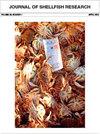Resiliency of Marine Benthic Communities in Sea Scallop Rotational Management Areas on Georges Bank
IF 1
4区 农林科学
Q3 FISHERIES
引用次数: 1
Abstract
ABSTRACT Area closures allow fish and shellfish populations and associated habitats to recover from the effects of fishing. Determining the appropriate duration of rotational management closures for the Atlantic sea scallop (Placopecten magellanicus) fishery requires information on both the recovery of scallop populations for subsequent harvest and the resiliency of marine benthic ecosystems for conservation objectives. Here, the effects of scallop fishing on the benthic communities of the northern edge of Georges Bank were examined with a control-impact environmental study comparing an area that had been closed to fishing for over 20 y to an area continually fished. Substrate composition, faunal density, and taxonomic richness data were collected using drop camera surveys. These areas have similar substrate composition, mostly cobble and gravel. Sediment in the control area shifted to larger particle sizes over time, whereas the sediment in the impact area remained the same, suggesting fishing activity prevented this shift in the impact area. Comparing survey stations of like substrate showed that as fishing effort subsided from 2015 to 2017, there was a marked recovery of taxonomic richness and abundance in the impact area. The impact and control areas shifted in a similar manner but varied in the intensity of the shift. This suggests the benthic communities in this area of Georges Bank were relatively resilient to the effects of fishing effort with mean densities of all categories recovering within 2 years.乔治海岸扇贝轮替管理区海洋底栖生物群落的恢复力
摘要区域关闭使鱼类和贝类种群及相关栖息地能够从捕鱼的影响中恢复。要确定大西洋扇贝(Placopecten magellanicus)渔业轮流管理关闭的适当时间,就需要了解扇贝种群的恢复情况以备后续捕捞,以及海底生态系统实现保护目标的复原能力。在这里,通过一项控制影响环境研究,将禁止捕捞20多年的区域与持续捕捞的区域进行了比较,研究了扇贝捕捞对乔治河岸北部边缘底栖生物群落的影响。基质组成、动物区系密度和分类丰富度数据是通过滴相机调查收集的。这些区域的基质成分相似,主要为卵石和砾石。随着时间的推移,控制区的沉积物向更大的颗粒尺寸移动,而影响区的沉积物保持不变,这表明捕鱼活动阻止了影响区的这种移动。对同类基质的调查站进行比较表明,随着2015年至2017年捕鱼活动的减少,影响区的分类学丰富度和丰度显著恢复。影响和控制区域以类似的方式发生了变化,但变化的强度不同。这表明乔治银行这一地区的底栖生物群落对捕鱼活动的影响具有相对的抵御能力,所有类别的平均密度在2年内都有所恢复。
本文章由计算机程序翻译,如有差异,请以英文原文为准。
求助全文
约1分钟内获得全文
求助全文
来源期刊

Journal of Shellfish Research
生物-海洋与淡水生物学
CiteScore
2.30
自引率
0.00%
发文量
40
审稿时长
6 months
期刊介绍:
Original articles dealing with all aspects of shellfish research will be considered for publication. Manuscripts will be judged by the editors or other competent reviewers, or both, on the basis of originality, content, merit, clarity of presentation, and interpretations.
 求助内容:
求助内容: 应助结果提醒方式:
应助结果提醒方式:


